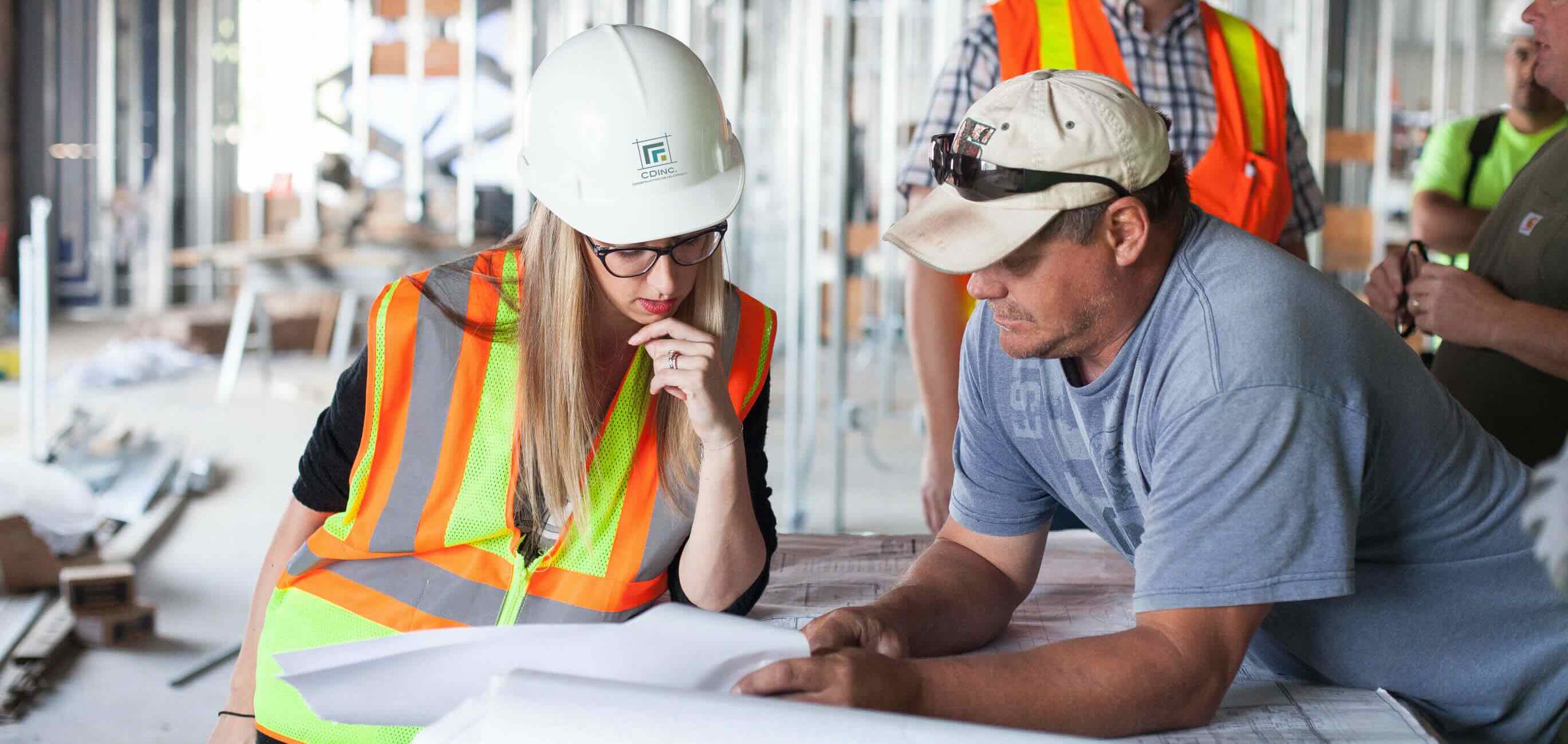Home>diy>Building & Construction>What Is The Difference Between Project Management And Construction Management


Building & Construction
What Is The Difference Between Project Management And Construction Management
Modified: January 6, 2024
Discover the distinction between project management and construction management in the building-construction industry. Explore the key roles, responsibilities, and skills required for each field.
(Many of the links in this article redirect to a specific reviewed product. Your purchase of these products through affiliate links helps to generate commission for Storables.com, at no extra cost. Learn more)
Introduction
When it comes to complex building projects, it is essential to have effective leadership and management in place. Two roles that are often central to the success of a construction project are project management and construction management. While these terms are often used interchangeably, there are distinct differences between the two disciplines.
Project management and construction management involve overseeing and coordinating various aspects of a building project, but they each have unique responsibilities and goals. Understanding these differences can help stakeholders, including clients, contractors, and other team members, better navigate the construction process and ensure successful outcomes.
In this article, we will explore the difference between project management and construction management, delving into their definitions, key responsibilities, scope and goals, required skills and expertise, project phases and processes, as well as collaboration and communication differences. By gaining a clear understanding of these distinctions, professionals in the construction industry can effectively adapt their approach and ensure seamless project execution.
Key Takeaways:
- Project management encompasses the entire project lifecycle, focusing on planning, organizing, and controlling resources to achieve project objectives. Effective communication and collaboration are crucial for successful project execution.
- Construction management focuses specifically on the physical construction process, ensuring adherence to plans, specifications, safety regulations, and quality standards. Specialized knowledge in construction techniques and codes is essential for construction managers.
Definition of Project Management
Project management is the practice of planning, organizing, and controlling the resources and activities required to achieve specific project goals within a defined timeline and budget. It involves coordinating the efforts of a diverse team, including architects, engineers, subcontractors, and suppliers, to ensure the successful completion of a project.
A project manager plays a crucial role in project management. They are responsible for setting project objectives, developing a comprehensive project plan, assigning tasks to team members, monitoring progress, and resolving any issues that may arise. They must also manage project risks, communicate effectively with stakeholders, and ensure that the project is delivered on time and within the allocated budget.
In the context of construction, project management encompasses all the activities related to planning, designing, and constructing a building or infrastructure. It involves overseeing various aspects, such as procurement, scheduling, budgeting, quality control, and risk management.
Project management is dynamic and requires constant adaptation and decision making. It involves balancing competing objectives, such as cost, quality, and schedule, while also considering the needs and expectations of clients and other stakeholders.
Successful project management in construction requires a thorough understanding of construction methods, building codes and regulations, cost estimating, and contract management. Additionally, project managers must possess strong leadership qualities, excellent communication skills, and the ability to collaborate effectively with diverse project teams.
Definition of Construction Management
Construction management, also known as construction project management, refers to the overall planning, coordination, and control of a construction project from inception to completion. It involves overseeing a wide range of activities, including design coordination, cost management, scheduling, quality assurance, and safety.
A construction manager is responsible for ensuring that a construction project is executed smoothly and efficiently. They serve as the primary point of contact between the project owner, design professionals, and the construction team. Their role encompasses tasks such as managing contracts, procuring materials and equipment, hiring subcontractors, and monitoring progress.
Construction management is focused on the execution and delivery of the physical construction project. It involves translating the project plans and specifications into tangible results by coordinating the efforts of various tradespeople, craftsmen, and suppliers. This includes overseeing construction activities, tracking project milestones, and ensuring compliance with building codes and regulations.
Effective construction management requires a deep understanding of construction techniques, materials, and building systems. Construction managers must be knowledgeable about industry standards, compliance requirements, and best practices. They also need to possess strong leadership skills, problem-solving abilities, and a keen attention to detail.
In addition to technical expertise, construction managers must have excellent communication and interpersonal skills. They must be able to effectively communicate with a wide range of stakeholders, including clients, architects, engineers, subcontractors, and regulatory authorities. Clear and consistent communication is essential for facilitating collaboration, resolving conflicts, and ensuring that everyone is aligned with the project goals.
Construction management is a critical function in the construction industry, as it ensures that projects are completed on time, within budget, and to the required quality standards. It requires a holistic approach that considers the project from its initial conception through to its final completion and handover.
Key Responsibilities of a Project Manager
Project managers play a pivotal role in ensuring the successful execution of construction projects. They are responsible for overseeing and coordinating a wide range of activities to ensure that project goals are achieved. Here are some key responsibilities of a project manager:
- Planning: Project managers are responsible for creating a detailed project plan that outlines the scope, objectives, deliverables, timeline, and budget. They collaborate with stakeholders to define project requirements and develop a roadmap for execution.
- Resource Allocation: Project managers allocate resources, including labor, equipment, and materials, to ensure that project tasks can be completed efficiently. They assess the availability and capabilities of resources and make strategic decisions to optimize resource utilization.
- Team Leadership: Project managers lead and motivate their project team, coordinating the efforts of architects, engineers, contractors, and other professionals. They provide guidance, set expectations, and foster a collaborative and productive work environment.
- Risk Management: Project managers identify and analyze potential risks that could impact project success. They develop mitigation plans to minimize the impact of risks and ensure that appropriate contingency measures are in place. This involves monitoring risks throughout the project and taking proactive actions to address any emerging issues.
- Communication: Effective communication is key to successful project management. Project managers facilitate regular communication among all stakeholders, including clients, team members, and subcontractors. They provide timely updates, address concerns, and ensure that everyone is aligned with project objectives and milestones.
- Budget and Cost Control: Project managers are responsible for monitoring project costs and ensuring that they stay within the allocated budget. They track expenses, review financial reports, and implement cost-saving measures where possible. They also manage change orders and variations, ensuring that they are properly documented and approved.
- Schedule Management: Project managers develop and maintain a project schedule, outlining the sequence of activities and their respective timelines. They monitor progress, track milestones, and make adjustments as needed to keep the project on track. This includes identifying critical paths, managing dependencies, and resolving scheduling conflicts.
- Quality Assurance: Project managers are accountable for ensuring that the project meets the specified quality standards. They establish quality control processes, conduct inspections, and address any deficiencies. They also work closely with quality control personnel to implement corrective actions and continuously improve project quality.
These are just some of the key responsibilities of a project manager in construction. Their role is multifaceted, requiring a blend of technical knowledge, leadership skills, and effective project management techniques to deliver successful outcomes.
Key Responsibilities of a Construction Manager
Construction managers play a crucial role in overseeing the physical construction process and ensuring the successful completion of a project. They are responsible for managing various aspects of the construction process and coordinating the efforts of contractors, subcontractors, and other team members. Here are some key responsibilities of a construction manager:
- Project Planning: Construction managers are involved in the early stages of a construction project, assisting with project planning and budgeting. They collaborate with architects, designers, and engineers to ensure that the project plans are feasible and meet the client’s requirements.
- Contract Management: Construction managers are responsible for managing the contracts and agreements with subcontractors, suppliers, and consultants. They review and negotiate contracts, ensure compliance, and handle any disputes or issues that may arise during the construction process.
- Scheduling and Resource Allocation: Construction managers create and manage a construction schedule, coordinating the timing and sequencing of various construction activities. They allocate resources, including labor, equipment, and materials, to ensure that work progresses smoothly and according to the schedule.
- Budget Control: Construction managers monitor project costs and ensure that the construction project stays within the allocated budget. They review and approve project expenses, track financial performance, and implement measures to control costs. They also manage change orders and variations, ensuring that they are properly documented and approved.
- Quality Assurance: Construction managers are responsible for ensuring that the construction work meets the required quality standards. They develop and implement quality control processes, conduct inspections, and address any deficiencies or non-compliance issues. They work closely with quality control personnel to ensure that construction work is carried out to the highest standards.
- Health and Safety Management: Construction managers prioritize the health and safety of workers on the construction site. They implement and enforce safety protocols, conduct regular safety inspections, and ensure that proper safety measures are in place. They also monitor compliance with health and safety regulations and address any identified risks or hazards.
- Communication and Stakeholder Management: Construction managers serve as the primary point of contact for stakeholders, including clients, architects, engineers, and subcontractors. They facilitate effective communication, provide progress updates, and address any concerns or issues that arise during the construction process. They ensure that all stakeholders are informed and aligned with project goals.
- Problem Solving and Conflict Resolution: Construction managers are skilled in problem-solving and conflict resolution. They anticipate and address issues that may arise during construction, such as design changes, unforeseen site conditions, or labor disputes. They collaborate with stakeholders to find solutions and maintain positive working relationships.
These key responsibilities highlight the critical role that construction managers play in the successful execution of construction projects. Their expertise in project management, technical knowledge, and effective communication skills contribute to the timely and efficient completion of construction projects.
Project management focuses on the overall planning, coordination, and control of a project, while construction management specifically deals with the planning and execution of construction projects. Both require strong organizational and leadership skills.
Differences in Scope and Goals
While project management and construction management are closely related fields, they have distinct scopes and goals. Understanding these differences is crucial for effectively overseeing and managing construction projects. Here are the key differences:
Scope of Project Management: Project management encompasses the entire lifespan of a project, from initiation to completion. It involves planning, organizing, controlling, and coordinating various resources and activities to achieve project objectives. The scope of project management extends beyond construction and includes tasks such as defining project requirements, establishing project team roles, managing contracts, and ensuring effective stakeholder communication.
Scope of Construction Management: Construction management focuses specifically on the physical construction process. It involves coordinating and supervising the construction activities, managing subcontractors and suppliers, ensuring compliance with building codes and regulations, and overseeing quality control. The scope of construction management revolves around executing the construction project according to the project plans and specifications, while adhering to safety and quality standards.
Goals of Project Management: The primary goals of project management are to deliver the project on time, within budget, and to the required quality standards. Project managers are responsible for ensuring that project objectives and milestones are met, as well as managing risks and communicating with stakeholders. Project management also aims to establish effective project controls, foster collaboration among team members, and ensure client satisfaction.
Goals of Construction Management: Construction management focuses on the successful completion of the construction project. The main goals include executing the construction work according to the project plans, meeting quality standards, ensuring site safety, and delivering the project within the allocated budget. Construction managers aim to coordinate construction activities efficiently, manage resources effectively, and resolve any issues or challenges that arise during the construction process.
In summary, project management has a broader scope that encompasses the entire project lifecycle, while construction management is more focused on the physical construction process. Project management aims to achieve overall project objectives and stakeholder satisfaction, while construction management focuses on executing the construction work to meet quality, safety, and budget requirements. Both disciplines are essential for the successful completion of construction projects, and effective collaboration between project managers and construction managers is crucial for project success.
Differences in Skills and Expertise
Project management and construction management require distinct sets of skills and expertise due to their different focuses within the construction industry. Here are the key differences in skills and expertise between the two disciplines:
Project Management Skills and Expertise: Project managers require a broad range of skills to effectively oversee all aspects of a construction project. These skills include:
- Leadership and Team Management: Project managers must have strong leadership qualities to guide and motivate their project team. They need excellent communication, negotiation, and conflict resolution skills to manage diverse stakeholders.
- Project Planning and Control: Project managers must be proficient in developing detailed project plans and schedules, setting timelines, and tracking progress. They need expertise in budgeting, cost control, and resource management to ensure project success.
- Risk Management: Project managers need to identify and assess potential risks and develop strategies to mitigate them. They must have expertise in risk analysis, contingency planning, and decision-making to handle project uncertainties.
- Contract Management: Project managers must possess knowledge of construction contracts and procurement processes. They should understand contract terms and conditions, manage contractual relationships, and evaluate bids and proposals.
Construction Management Skills and Expertise: Construction managers focus on the physical execution of the construction process. They require specialized skills and expertise, including:
- Construction Techniques and Codes: Construction managers must have a deep understanding of construction methods, building codes, and regulations. They need to ensure compliance with safety standards, quality requirements, and environmental regulations.
- Construction Planning and Sequencing: Construction managers should be skilled in planning and sequencing construction activities, coordinating work phases, and managing construction schedules. They need to understand critical paths, dependencies, and construction logistics.
- Quality Control and Assurance: Construction managers must have expertise in quality management, including inspection procedures, testing protocols, and non-conformance resolution. They ensure that construction work meets specified standards and quality expectations.
- Construction Technology: Construction managers should be familiar with construction software, tools, and technologies. They need knowledge of building information modeling (BIM), project management software, and construction-related applications.
These differences in skills and expertise highlight the unique focuses of project management and construction management within the construction industry. While project managers require a broader skill set to manage all aspects of a project, construction managers need specialized knowledge in construction techniques, codes, and execution. Collaboration and effective communication between project managers and construction managers are essential to ensure successful project outcomes.
Differences in Project Phases and Processes
Project management and construction management involve distinct project phases and processes that contribute to the successful completion of a construction project. Understanding these differences can help stakeholders effectively navigate the construction process. Here are the key differences in project phases and processes between project management and construction management:
Project Management Project Phases: Project management typically follows a standardized project lifecycle, which includes the following phases:
- Initiation: The project is conceptualized, and the feasibility and viability are assessed. Project goals and objectives are defined.
- Planning: Project plans are developed, including scope, budget, timeline, and resource allocation. Risk management and stakeholder management strategies are created.
- Execution: The project plan is put into action. Resources are procured, and tasks are assigned to team members. Project progress is monitored and controlled.
- Monitoring and Control: Project performance is monitored, and any deviations from the plan are addressed. Adjustments and corrective actions are taken to keep the project on track.
- Closure: The project is completed, and final deliverables are handed over to the client. Lessons learned are documented, and the project is formally closed.
Construction Management Project Processes: Construction management focuses specifically on the physical construction process and follows a different set of processes:
- Design and Pre-construction: This phase involves collaboration between architects, engineers, and other stakeholders to develop detailed project plans, drawings, and specifications.
- Procurement: Construction managers ensure the timely procurement of materials, equipment, and subcontractors in alignment with the project schedule.
- Construction Execution: The construction phase includes mobilization, site preparation, and actual construction activities. Construction managers coordinate and supervise the work to ensure compliance with plans and specifications.
- Quality Control: Construction managers implement quality control processes to monitor and evaluate the quality of construction work. Inspections and tests are conducted to ensure compliance with specified standards.
- Health and Safety: Construction managers prioritize worker safety and ensure that proper safety measures are in place. They monitor and enforce safety protocols to prevent accidents and injuries.
- Progress Monitoring: Construction managers track project progress, update schedules, and address any delays or issues that arise during construction. They ensure that work is completed according to the project schedule.
- Completion and Handover: In this final phase, construction managers oversee the completion of construction work, conduct final inspections, and ensure that all necessary documentation is in order. The project is then handed over to the client.
These differences in project phases and processes highlight the specific focuses of project management and construction management. While project management encompasses the entire project lifecycle and manages all project aspects, construction management zooms in on the construction process itself, ensuring adherence to plans, specifications, and safety requirements. Collaborating effectively between the project manager and construction manager is crucial to successfully navigate these different phases and processes in construction projects.
Collaboration and Communication Differences
Collaboration and communication are critical aspects of both project management and construction management. However, there are distinct differences in how collaboration and communication are approached in these disciplines. Understanding these differences is essential for fostering effective teamwork and ensuring project success. Here are the key collaboration and communication differences between project management and construction management:
Collaboration in Project Management: Project management requires collaboration among various stakeholders to achieve project objectives. Project managers facilitate collaboration by:
- Establishing a Project Team: Project managers assemble a diverse team of professionals with different areas of expertise to contribute to the project’s success. They ensure that team members understand their roles, responsibilities, and project goals.
- Promoting Cross-Functional Collaboration: Project managers encourage collaboration and knowledge sharing between different functional teams within the project. They facilitate effective communication and collaboration between disciplines, such as architecture, engineering, and procurement.
- Facilitating Stakeholder Engagement: Project managers engage and involve stakeholders throughout the project lifecycle. They conduct regular stakeholder meetings, gather input and feedback, and address concerns to maintain transparency and alignment.
- Managing Interdependencies: Project managers identify and manage interdependencies between project tasks and teams. They coordinate efforts, resolve conflicts, and ensure that all teams are working towards the common project goals.
- Encouraging Teamwork: Project managers foster a collaborative work environment where team members can communicate openly, share ideas, and contribute to problem-solving. They promote teamwork and synergy among team members.
Collaboration in Construction Management: Construction management focuses on collaboration between project stakeholders directly involved in the construction process. Construction managers drive collaboration by:
- Coordinating Trade Contractors: Construction managers coordinate and oversee the work of trade contractors, such as electricians, plumbers, and carpenters. They ensure that different trades work in harmony and synchronize their efforts.
- Managing Supplier and Subcontractor Relationships: Construction managers collaborate closely with suppliers and subcontractors to ensure timely delivery of materials and coordination of subcontracted work. They establish effective communication channels and manage the contract relationships.
- Addressing Construction Challenges: Construction managers collaborate with stakeholders to address site-specific challenges, such as unforeseen ground conditions, weather delays, or design modifications. They work together to find solutions and keep the project on track.
- Coordinating Construction Activities: Construction managers are responsible for coordinating the sequence and timing of construction activities. They ensure that each trade completes their work in the correct order, minimizing conflicts and delays.
Communication Differences: Communication in project management and construction management varies in terms of the parties involved and the information shared. Some key differences include:
- Stakeholder Communication: Project managers focus on broader stakeholder communication, including clients, executives, and regulatory authorities. Construction managers primarily communicate with project teams, trade contractors, and suppliers directly involved in the construction process.
- Reporting and Documentation: Project managers generate comprehensive project reports and documentation to keep stakeholders informed about project progress, risks, and issues. Construction managers often rely on daily site reports, progress photos, and field documentation to document and communicate site activities.
- Technical Communication: Project managers communicate in non-technical terms to ensure that all stakeholders understand project objectives and progress. Construction managers communicate technical information, such as construction plans and specifications, to ensure accurate implementation.
By recognizing these collaboration and communication differences, project stakeholders can adapt their approach to fit the specific requirements of project management or construction management settings. Effective collaboration and communication are crucial for successful project execution and maintaining strong working relationships among all project participants.
Read more: What Is Construction Quality Management
Conclusion
In the world of construction, project management and construction management are two distinct but interconnected disciplines that play vital roles in ensuring successful project outcomes. While they share some similarities, there are significant differences in their scopes, responsibilities, skills, and communication approaches. Recognizing and understanding these differences is crucial for stakeholders involved in construction projects.
Project management encompasses the entire project lifecycle, focusing on planning, organizing, and controlling resources to achieve project objectives. Project managers are responsible for managing project risks, coordinating teams, and ensuring project completion on time and within budget.
On the other hand, construction management focuses specifically on the physical construction process. Construction managers oversee the execution of construction activities, ensuring the adherence to plans, specifications, safety regulations, and quality standards.
The differences in project phases and processes between project management and construction management highlight their distinct focuses. Project management covers all project phases, from initiation to closure, while construction management places emphasis on the construction execution phase.
The skills and expertise required for project management and construction management also differ. Project managers need a broad skill set, including leadership, planning, and risk management, while construction managers require specialized knowledge in construction techniques, codes, and quality control.
Collaboration and communication also exhibit differences between project management and construction management. Project management involves broader stakeholder engagement and non-technical communication, while construction management focuses on coordinating subcontractors, suppliers, and technical communication.
In conclusion, both project management and construction management are vital for successful construction projects. Their different focuses and responsibilities complement each other, and effective collaboration between project managers and construction managers is essential. By recognizing and capitalizing on these differences, construction industry professionals can enhance their ability to navigate complex construction projects and achieve optimal project outcomes.
Frequently Asked Questions about What Is The Difference Between Project Management And Construction Management
Was this page helpful?
At Storables.com, we guarantee accurate and reliable information. Our content, validated by Expert Board Contributors, is crafted following stringent Editorial Policies. We're committed to providing you with well-researched, expert-backed insights for all your informational needs.














0 thoughts on “What Is The Difference Between Project Management And Construction Management”